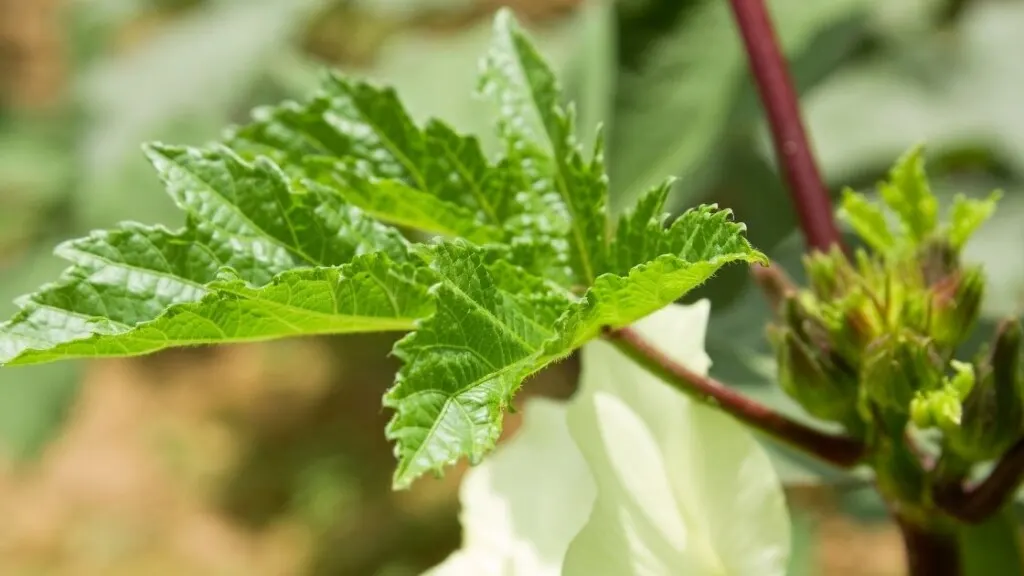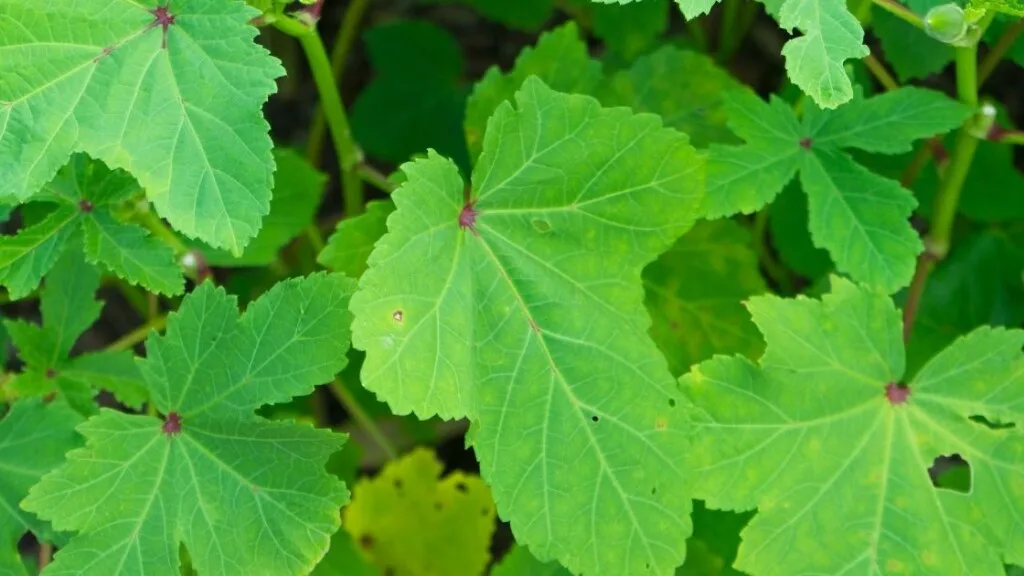
Despite the fact that many northerners have never had okra, it is a meal that is particularly southern and connected with regional cuisine. Despite this, many southerners only use the okra pods in their cooking; however, what about eating the okra leaves? Is it possible to eat the okra leaves?
Table of Contents
What are Okra Leaves?
Okra leaves are the huge, green leaves of the okra plant that are found on the ground.
They are usually between 4 and 8 inches in length, depending on how large the plant was when it was first planted. The texture of the leaves is often ribbed in appearance.
They have a flavor that is similar to spinach or collard greens, with a tinge of pepper heat.
Despite the fact that they can be eaten raw, they are frequently cooked in the same way that spinach or other greens are.
Are Okra Leaves Edible?

Yes, okra leaves are edible and good for you! It is important to note that the leaves do not taste exactly like summer-fresh green beans or peas, however. Instead, they have a much stronger flavor than green beans but are lighter than kale, collards, or spinach.
Okra leaves are often used in southern cooking, especially popular in dishes like gumbo and other creole mixes.
They are so popular because they are easy to grow, provide food for the table fairly quickly, and can be cooked with many different vegetables or meats.
Are Okra Leaves Safe To Eat?

Yes! Okra leaves are safe to eat if cooked properly. Although people often avoid okra leaves because they think the leaves may be toxic, this is not true.
There are many nutrients in them and they are good for you.
They should definitely not be eaten raw because they could cause mild stomach upset in some individuals who have sensitive digestive tracts. Some people will also try pickling the leaves or cooking them in a leafy green soup or stew.
Eating okra leaves can be a good way to get more nutrients into your diet. As with all foods, remember to take everything in moderation and not to overindulge!
Benefits of Eating Okra Leaves

Now that you know it is possible and safe to eat okra leaves, let us look at what nutrients and vitamins do okra leaves contain:
Okra Leaves Contains Fiber
This is one of the most important and health-benefiting parts of okra leaves; it is packed with fiber, meaning it will make you feel full for long periods. Once in your stomach, dietary fiber makes foods stay there for a longer time, delaying the onset of hunger. On top of that, dietary fiber makes you feel full for longer periods since it swells in the stomach by absorbing large amounts of water.
Vitamin A
Okra leaves contain vitamin A which is important to good vision and healthy skin. It is also essential for your immune system because it stimulates white blood cells known as lymphocytes; these are the cells responsible for protecting the body against diseases and infections
Vitamin C
Just like oranges, okra leaves are packed with vitamin C. Vitamin C is important because it boosts the immune system by producing white blood cells which fight off infection. It also helps to soften your gums by improving their natural immunity. Vitamin C also assists in reducing heart diseases by preventing the formation of a blood clot from platelets.
Vitamin E
Okra leaves contain vitamin E which is important because it helps to protect your cells from damage and malignancy. In addition, research shows that eating foods high in vitamin E increases sperm motility as well as sperm count.
Potassium
Okra leaves are very high in potassium which is an electrolyte that regulates heart rate and blood pressure. Potassium also prevents the occurrence of strokes because it thins your blood by relaxing your artery walls; this then makes it easier for blood to flow through them.
Calcium
This is another important nutrient that you will find in okra leaves. Calcium is important because it boosts the health of your nerves, nails, and teeth. It also ensures that your muscles are strong enough to be able to contract smoothly on their own. Research shows that calcium prevents the onset of arthritis by keeping bones dense and healthy.
Iron
Lastly, but no less important, are iron; it is extremely hard to find any leafy greens that are not high in iron so it is good news to know okra leaves contain it too. Iron helps the cells produce energy because it assists with the production of hemoglobin which then transports oxygen through your blood.
It also produces enzymes that assist in breaking down food, making them easier for the body to absorb and process.
How To Prepare Okra Leaves So They Are Tasty And Edible

There are several ways in which you can prepare okra leaves so they taste good and are an enjoyable experience for your palate. Here are some steps you can follow:
The first thing you need to do is pick the right okra leaves to eat. You should only use young leaves that are tender and not too bulky to avoid the unpleasant experience of choking and gagging when you swallow them.
You can then either pickle the leaves, cook them in a leafy green soup or cook them in a stew with other vegetables.
The third step is where you add your choice of seasonings and spices and you can also add salt if you like.
You can then steam the leaves for a good 10 minutes or until they become tender; do not overcook them since this will make them slimy and tasteless After that, you can either serve the okra with tomato sauce or any other kind of sauce such as chocolate.
Final Thoughts
Okra leaves can be a very versatile and healthy addition to your diet.
However, it is important that you only eat them as long as they are young and tender as this will guarantee you will enjoy the taste of the leaves as well as their numerous health benefits. As always, consult with your doctor before starting any new dietary regimen to ensure that it is safe for you.


Leave a comment